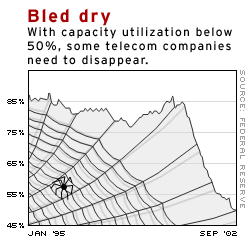NEW YORK (CNN/Money) - You thought they were gone forever, but all those telecoms that filed for bankruptcy last year look like they're going to come back from the dead. A pity for the ones left standing: They're being dealt a problem that a pinch of holy water, garlic and sunlight can't make go away.
The first of the failed telecoms to rise again was Williams Communications, a broadband wholesaler, that came out of bankruptcy in October with a new name, WilTel Communications, but otherwise intact.
Fiber-optic wholesaler 360networks is expected to come out of bankruptcy any day now. Next year we should see the re-emergence of Global Crossing, XO Communications and, yes, WorldCom.
"You want these guys going away completely," said Merrill Lynch chief U.S. investment strategist Rich Bernstein, "and it doesn't seem to be happening."
Instead, they're coming back with balance sheets that are not just stronger than before but stronger than many of their peers'. Williams Communications had $7.15 billion in debt when it filed for bankruptcy protection back in April; the new WilTel has just $375 million in bank debt.
360networks will have $100 million in cash and $215 million in bank debt, compared with the $2.7 billion it had pre-bankruptcy. If the creditors who have WorldCom in their charge have their druthers, WorldCom, too, will emerge relatively free of debt.
Compare that with troubled telecom operators Qwest and Sprint, each of which have more than $20 billion in debt. A debt-free WorldCom will be able to severely undercut them in price, which in turn could send them into bankruptcy. They, too, could emerge free of debt, and work to price their competitors out of business. And so on.
Fearing exactly that, regional Bells like BellSouth, SBC and Verizon have been arguing that WorldCom should be liquidated, rather than allowed to come back into business.
Lazarus, what was it like?
It's a silly argument, thinks New York University economist Lawrence White, and not one they're likely to win. Bankruptcy law says that WorldCom's creditors, who have already suffered huge losses, get to decide what to do. If they decide that the best return they're going to get will come from keeping the asset intact as a company, so be it.
"If there's a credible business going forward, it should survive," White said. "And if that causes problems for the Verizons of the world, too bad."

But others worry that the way bankruptcy is being used means that the pain in telecom will be drawn out much longer.
In its present form Chapter 11 of the bankruptcy code, which focuses on rehabilitating companies, has only been in effect since late 1979 -- the idea is that everybody is better off if a horribly managed company is set right rather than disappearing. It's steadily gained popularity since then: In 1980, just 3 public companies filed for Chapter 11, 29 filed in 1990, and last year 95 filed.
But here, points out Credit Suisse First Boston chief investment officer Paddy Jilek, we're talking about an entire industry that was overcapitalized, badly managed and strains under a capacity load that just doesn't make sense. "Chapter 11 seems to impose a strong bias toward the continuation of unprofitable businesses," he wrote in a recent report, "when the most efficient outcome for the industry and the economy is liquidation."
Capacity utilization in the communications industry -- simply put, the amount of stuff companies have lying around that they're actually using -- fell to a stunningly low 49.9 percent in September, according to the Federal Reserve. Letting companies die would exhaust a lot of that capacity, argues Jilek.
Turning Japanese?
In some ways, it seems a version of what's gone on in Japan for the past decade, where companies are kept alive by the banks that have extended loans to them. These so-called zombie companies have, in turn, damaged the entire economy.
Daiei, for example, a large department store chain, should by all rights have failed years ago, but its creditors don't want to see it go because that would mean realizing their loss, which would have negative consequences.
And so Daiei keeps stumbling along, introducing competitive pressures that shouldn't be there -- prices fall and the entire industry struggles. "Deflation," said Prudential Securities chief investment strategist Ed Yardeni, "is companies that are losing money not going out of business."
Another negative consequence of those competitive pressures is that the creditors of companies that might otherwise be healthy, sans Daiei or WorldCom, start to feel the pinch. And this makes them unwilling to extend credit to other areas of the economy, where it might actually do some good.
Still, NYU's White thinks that meddling with the process now would be courting more of a Japanese-style problem than letting it take its course. It will be a painful process, and it will be longer than many people would like, but eventually the air will be cleared.
"People worry we could have serial bankruptcies," he said. "Yeah that's a possibility. But we've got too much overcapacity here. Why turn our back on efficiency just to protect some lenders to Verizon?"

|

